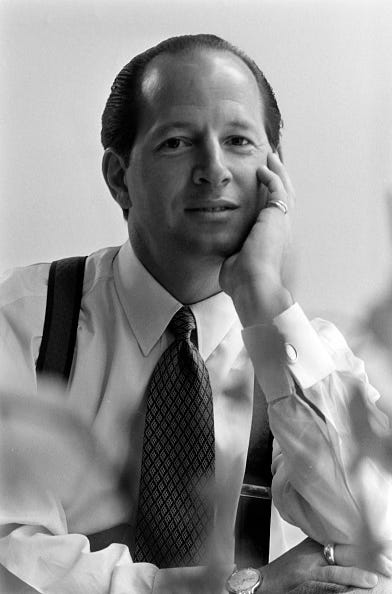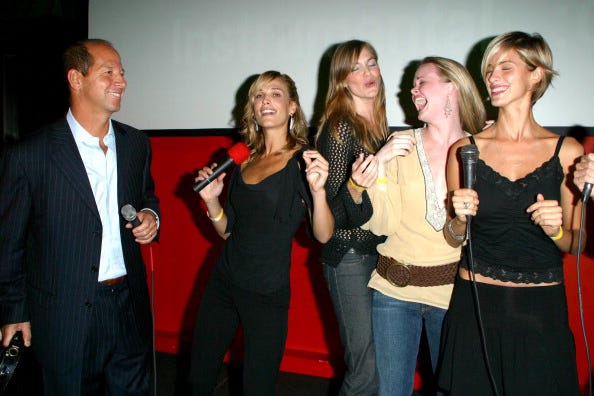Core curriculum: Beware! Judgement zone ahead!
Chapter two of my series, "Everything you need to know I learned at Vogue." Plus, how to survive rejection.
Vogue made me over during my time there in the 90s, from the inside out. And, in the process, I accidentally uncovered their secrets for doing so. This is the second installment of my series, "Everything you need to know I learned at Vogue.” Check out the first one here!
Welcome to The Judgement Zone
When you leave college, you will enter into The Judgement Zone. No one will tell you this. I repeat. No one will tell you this.
From this moment on, getting the job, doing the job, and succeeding on the job will depend on the opinions that others form of you. Your future will be shaped by the first impression that you make on everyone you now meet. They will notice what you are wearing, judge if you don’t look them in the eye and also firmly shake their hand, and they will privately assess — as you tell them about yourself.
Yes, brutal.
How much criticism can one person take? Sometimes working at Vogue felt like walking on eggshells. Where every corner I turned, or office I passed, or ladies room encounter was met with observations about my hair, my look, my posture, or some backhanded commentary like, “Wow, those shoes must be so comfy.”
Talk about the ultimate judgement zone!
There were no triangular signs posted to warn me about the point of no return. I walked in clueless, and completely unprepared.
And since there were only about 100 of us on staff at the time, it felt impossible to avoid the spotlight of judgement. First as an inductee into the process, and then as a contributor, among many, to the indoctrination of Vogue’s new arrivals.
There was no playbook or primer filled with insider’s information. Had such a thing existed, it would have felt heaven-sent in the moment. Instead, the transformation took place in the form of a very public and painful initiation into Vogue as a state-of-mind and physical way-of-being.
As a Vogue “survivor,” I learned that style is always personal and polished, being super smart is cool, and aspiring to master levels of organization is only everything.
The Lesson: Equip yourself to elevate the impression that you make on the world. Since from now on, people will make snap judgements about you. Develop the specific skills to pass anyone’s assessment of you — so you can strive, survive, thrive, and ultimately enjoy the last laugh.
This daily embracing of Vogue’s skill set will soon become instinctive, and will serve as its own operating manual- for the rest of your life.
The run-up to meeting Mr. Big: Rejection doesn’t have to be final
Have you been turned down for the dream entry-level position, from the even dreamier company? Please know that how you handle this rejection will make the difference between landing that next opportunity, and not.
On my very first visit to Vogue, I failed the human resources typing test, which immediately disqualified me from meeting anyone who actually worked at the magazine.
It was only after my first rejection, that I realized just how much I wanted to work at Vogue. So I made a second attempt. And failed HR’s typing test. Again.
Rejection #2 hurt. A lot. I licked my wounds, took stock, and decided I had to fight for it. I laid low for a bit (to give HR a rest from my super enthusiastic self), and then went back for round three with Condé Nast HR, glutton for punishment as I was.
This time my interview went so well that they even let me skip their typing test.
(In retrospect, I believe HR deployed their typing test to instantly end the interview process with someone they had no interest in hiring. So I was relieved to break through this very real internal barrier.)
HR called the next day, and came up with a position for me that surpassed my wildest expectations. My title would be Merchandising Editor, and if I could somehow pass the next grueling round of interviews, I would become the face of Vogue to its readers, advertisers, and the press.
I made it through multiple next rounds of meetings with Vogue staffers, and gave a formal presentation, which must have gone well enough.
It appeared that they might hire me, and it felt like too much to hope for.
The last step in the process was to meet Vogue’s Publisher Ron Galotti. And protocol dictated that right before that, I would be presented to Editor-in-Chief Anna Wintour. If Anna was reviled by the very sight of me, then she could — and would — end my chances on the spot. And by the by, this did happen at Vogue.
But strangely, the plan changed at the last minute. I was instructed to (for some reason) skip this meeting with Anna, and go straight to see Ron. Even HR seemed excited for me.
All I needed to do now was walk in and land this job, which would become a credential I would permanently possess, since to work- or to have worked- at Vogue has for so long been seen as a mark of distinction.

My interview with Ron Galotti, the real-life inspiration for Sex and the City’s “Mr. Big” character, took place in his office at 8:30 on a Monday morning.
Ron’s assistant, Renée, walked me into his office, and seated us in leather club chairs in a tucked off corner of the room, next to the table on which sat his prized humidor.
Ron was wearing a showy pin-striped suit, an expensive watch that screamed “notice-me”, and there was a lot of product used to get his hair slicked front-to-back just so.
He leaned back in his club chair, put his feet up, lit a cigar, and looked at me.
He asked if I understood just how high-profile this (in context, junior level) position would be, and if I understood the amount of travel the job would require.
I told Ron that I was ready for all of it.
Ron asked if I was prepared to work hard. I told him I was ready to do just that.
At which point he leaned forward, blew out a puff of his cigar, and asked “So, are ya married?” I mustered something in response like “not yet!”
Ron’s last question to me (even at that time) would have set HR’s hair on fire. So I kept this last detail of our encounter under wraps to them.
The meeting was over. And I knew I had the job.
Remember that rejection is not necessarily final, and the key to success instead lies in how you respond when things don’t go your way. The front end of the process forced me to put up with useless typing tests, two rejections, endless interviews, and completely inappropriate questions.
The experience doesn’t have to make sense while you are living it. You just need to know why you are subjecting yourself to its endless (sometimes demeaning) demands.
The Lesson: Resiliency is everything. And good things come to those who don’t give up. In the meantime, you could become a great typist.
Maria Devaney graduated from Georgetown University in the 1990s, and would like to thank fellow alum Condé Montrose Nast who graduated in the 1890s from the same institution. Maria would also like to thank Franny Nast, Condé’s aunt, for funding his college education when his parents could not. Condé went on to become President of Georgetown’s student body, the same position for which Bill Clinton campaigned in the late 1960s, and lost.
After Georgetown, Condé worked for a college classmate’s father in magazine publishing, then broke off on his own in 1909 to acquire an obscure society publication called Vogue- and Condé built it into the media empire we know today.
“Everything You Need to Know I Learned at Vogue” began as a private letter to Maria’s (then small) daughter Margaux, and evolved into a four-year, on-campus workshop for students of The Georgetown Scholars Program (GSP) at Georgetown University in Washington, DC.
What I’m reading this week…
Back Row Amy Odell is the New York Times best selling author of Anna Wintour’s biographyANNA: The Biography. Amy’s letter is a must follow for up to the minute coverage and analysis in things fashion and media.
Martin “No Sale” delivers fashion, style, and notes on fashion history and the current state of the industry. Always a superb and substantively inspired read.
Monica Ainley DLV “Mon Review/Your Woman in Paris”: Fashion, style, and deeply clever cultural reporting from a Canadian fashion journalist/married to a Parisian/raising adorable tiny French children.
Adriana Trigiani To know Adriana is to love Adriana, as friend and force for good. Adriana is a bestselling author of 21 books in fiction and nonfiction, published in 38 languages. She is an award-winning playwright, television writer/producer, and human extraordinaire known for her spirituality, love of family & all things Italia.
Marisa Meltzer Soft Power Beauty-wellness-health from journalist Marisa Meltzer whose work has also appeared in The New York Times, Vogue, and Vanity Fair. Marisa is right now also working on a book about epic “French” (who was ironically actually English) cultural icon Jane Birken- due out in November 2025.






I know I'm terribly late, but thank you again for the mention here and for sharing details of your time at Condé! It was such a different time in magazines, and I appreciate you sharing your story with such honesty.